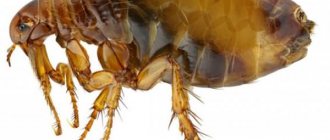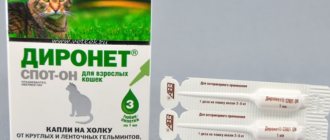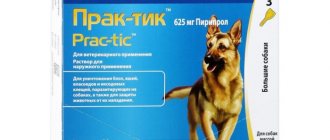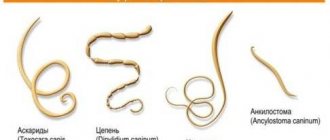Fluffy pets sometimes get sick. Often their illnesses are caused by parasitic organisms in their body.
The danger of parasites lies not only in the possible death of the animal, but also in infecting the people with whom the pet lives, especially children.
What to do in such a situation? To get started, we recommend reading this article. This article describes in detail methods of controlling parasites. We also recommend that you consult a specialist. Read the article >>>
Signs and symptoms of parasites
Different types of parasites are diagnosed in small kittens and adult cats. Ectoparasites live on the surface of the body. The most common of them are cat fleas, ticks, ixodid ticks, lice mites, ear mites, scabies mites, and red mites.
Endoparasites are protozoa, fungi and helminths that live inside the animal’s body: in the intestines, liver, mucous membranes, blood, lungs.
Many protocavitary and flatworms are called helminths. Worms that parasitize the body of animals and humans are worms. Most often, cats are carriers of roundworms, filaria, metagonia, acne, cestodosis, myiasis and others.
Filaria
Veterinarians strongly recommend monitoring the condition and well-being of kittens and immediately seeking a diagnosis and anthelmintic treatment in the following cases:
- Irregular bowel movements, diarrhea with mucus or blood followed by constipation: the presence of parasites in the stool:
- Vomiting of mucus, bile, blood: sometimes several worms come out with the vomit;
- Eggs or adult parasites on the kitten's fur and around the anus;
- Itching and burning in the anal area (the baby “rides” backwards on the floor, itches, and often restlessly licks itself);
- Bloating;
- Frequent coughing and sneezing, difficulty breathing, wheezing;
- Slow weight gain and then rapid weight loss;
- Lethargy and desire to hide;
- Hair loss, dull color, matting;
- Refusal of water and food;
- Convulsive syndrome and paralysis of the hind legs.
Anti-worming suspensions and tablets for kittens can be given from 3 weeks. First, there are some points to consider. If a kitten is taken from the street or from a shelter, it, in any case, needs to be dewormed - but a procedure should be carried out to get rid of other parasites (lice, fleas) and improve its health.
Some cat breeds (British, Persian, Russian Blue) have a tendency to develop diseases of the liver and other organs. Less toxic products (suspensions) are better suited for them.
Take a test for worms
Attention! Before purchasing anthelmintic tablets for kittens , be sure to visit a veterinarian and calculate the exact dosage! The wrong drug or the wrong dosage can be fatal! The instructions for use must be strictly followed!
Symptoms
It is much easier to become infected with worms than it might seem at first glance. Even if your pet is indoors 24 hours a day, he can still become infected with worms. You can bring them from the street on your clothes or shoes , it can be raw food or, strangely enough, there is even the possibility of infection from fleas. In general, as you can see, there can be many risk factors, which is why it is so important to prevent the possibility of infection. Indeed, in families where there are children, especially little explorers who are trying our world out, there is a high probability of transmitting worms to humans.
In order to protect yourself and your pet, the best way out is to give antihelminthic drugs as a prophylaxis once every 6 months.
Signs that a cat has worms may include:
- Decreased appetite . If a cat completely refuses to eat or significantly reduces the amount it eats, this may be an alarm bell. Sometimes there is a change in the animal’s gastronomic preferences; the cat may fall in love with something that previously turned up its nose or even begin to chew furniture.
- Change in behavior . A cat can get tired quickly, lose interest in what is happening around it, become apathetic, and tend to hide in a corner.
- Changes in appearance . Sometimes you may experience bloating or sudden weight loss. The cat's fur ceases to be silky and can quickly become greasy or fall out in pieces. The appearance of “tangles” or disheveled hair.
- Stool disorders . Frequent diarrhea regardless of food intake, the presence of blood or helminths in the stool. If a cat tries to “scratch” its anus after defecation, this indicates a disturbing itching associated with the presence of worms.
- Eye changes . Purulent discharge from the eyes or frequent tearing, sometimes you may notice yellowness of the eyes.
- You should also pay close attention to coughing and frequent sneezing.
Modern forms of drugs for worms make it possible to fight worms at all stages of development, regardless of their location in the intestines or even in tissues.
Is there a difference between the drugs?
The difference between the drugs lies in the method of administration, composition and targeting against certain types of parasites. Sometimes funds are prescribed in a complex manner.
- pills;
- sugar cubes;
- suspensions;
- pasty products.
Drops are applied externally. Injections are given using injections.
According to the type of helminths against which the action is directed, all drugs are divided into:
- antitrematodes (flatworms);
- anticestodes (tape);
- anti-nematode (round).
Efficiency depends on what active components are included in the medicine and in what quantity. Medicines with a complex composition are more effective than single medications. The release form does not affect the effectiveness. The difference in forms is necessary for ease of administration of the drug and to ensure that the active substances enter the body as quickly as possible.
Operating principle
Since both dosage forms of Helmintal contain the same active substances, their principle of action is identical:
- Moxidectin
is active against roundworms, as well as insects parasitizing animals, otodectic, demodectic and sarcoptic mites. It affects metabolism and leaves no chance for parasites to survive. Under its influence, serious disturbances occur in metabolic processes, which leads to paralysis and death of helminths and arthropods. - Praziquantel
is effective against tapeworms of various types. Due to increased permeability of cell membranes and disruption of metabolic processes, paralysis of the muscular system occurs. As a result, the parasites die in a short period of time.
The different release forms differ only in the mechanism of action. When applied externally, the active substances penetrate the bloodstream through the skin, and when used internally, they are absorbed in the gastrointestinal tract. If an animal has worms, it is better to use syrup, as it will begin to act within a couple of hours. But when using the solution externally, the maximum concentration of active substances in the blood occurs only after 2-3 days. If the external form of Helminthal is used, it is effective not only against helminths, but also against ticks, fleas, lice and other ectoparasites.
The drug has the ability to partially accumulate in the body. Thanks to this ability, the effect of the medication lasts for a month, and in some cases even longer.
Release form of anthelmintic drugs
Release forms should be considered separately. Each type has its own advantages and contraindications.
Tablets are the most popular medicine for worms. The drugs are in tablet form and are enteric-coated. Packed in cardboard boxes. According to the direction of action, tablets are divided into 2 types - narrowly targeted products that affect a specific type of parasite (round, tape) and universal, broad-spectrum products. Accordingly, the medicine contains one active component or a complex of them.
The mechanism of action of tablets on parasites is of 4 types:
- paralysis of muscle tissue;
- narcotic effects on nerve cells;
- obstacle to the metabolic process;
- destruction and burning of the outer protective shell of the parasites’ body (the most dangerous option, which can cause intoxication of the animal’s body).
It is rarely possible to give tablets to a kitten in one piece. First, the drug is crushed to a powder state, dissolved in water or broth and forcibly injected into the mouth through a syringe (without a needle).
Important! Emptying of the stomach must occur within 12 hours, otherwise intoxication of the body will occur!
Why are worms dangerous?
Many people think that if a pet is purely domestic, does not have contact with other animals, and does not go outside, then anthelmintic for cats is an unnecessary measure. Unfortunately, it is not. Worm larvae live in soil, plants, grass, and you may well carry parasites on your shoes or clothes.
Helminth eggs are found in raw meat and fish—often staples on a cat’s menu—as well as in tap water. Fleas, flies or mice caught by kittens can also become a source of infection.
Symptoms may not be noticed immediately, especially in an adult cat. Meanwhile, parasites multiply rapidly, having a detrimental effect on the animal’s body. If you don't give your cats deworming medication in time, the outcome can even be fatal.
It is also important to use an anthelmintic for cats in a timely manner because worms can easily be transmitted from animals to humans. This is relevant for families with children, because it is impossible to protect them from communicating with a cute furry pet.
The best medications for kittens
There are a lot of deworming tablets for cats, but in fact there are only six active anthelmintic ingredients. The drugs have different names because they are manufactured by different companies and contain different combinations of active ingredients.
Kittens are mainly infected with roundworms (Toxocara). Preparations based on pyrantel or piperazine are used at the age of 21 days and treatment is repeated after 14-21 days.
- One drug is used against cestodiasis in cats - Praziquantel (Azinox, Drontsit). It has a detrimental effect on all stages of parasite reproduction. To better remove worms from the intestines, the doctor may additionally prescribe a laxative.
- The drug "Fenbendazole" is effective against adult forms of nematodes, their eggs and larvae. Works in the intestines and respiratory system. It also destroys tapeworms.
- The drug "Pirantel" destroys adult nematodes at all stages of their development.
- Milbemycin acts on nematodes and their larvae, but not on eggs.
- The drug "Albendazole" ("Nemozol") destroys adult forms of nematodes, as well as cestodes and their larvae.
Medicines for kittens
Deworming remedies for kittens are varied. A veterinarian or a competent veterinary pharmacy worker can help you choose the right one. You should not buy anthelmintic drugs for kittens in random places, supermarkets, or from hand. If the terms and conditions of their injury were violated, then at best the remedy will be useless, at worst it will poison the kitten.
Anti-worm medications can be divided by age:
From three weeks
You can give drontal in tablets, prazicide in suspension, troncil K, kanikvantel.
From five weeks
Kittens are given anthelmintic drugs such as Profenler drops.
From six weeks of age
Milbemax is indicated (in addition to intestinal parasites, this drug destroys dangerous filariae that affect the heart, lungs and blood vessels).
From three months
Pratel, febtal, polyvercan tablets and inspector drops on the withers (act against ecto- and endoparasites).
Drugs that affect filariae should be used with caution in large concentrations of parasites of this type, since their massive death can lead to severe intoxication of the animal.
Time limits for deworming in cats and kittens
Every quarter - three months - the kittens are given anthelmintic drugs. Some products are used over a period of 10-14 days. Before this, their fur is treated for external parasites.
The first helminthization kills adults and only the second one destroys the eggs. If the eggs are not destroyed, a new generation of worms will take the place of the previous one.
A kitten feeding on its mother's milk must be weaned off milk before treatment.
Pregnant animals are treated only in case of severe infestation, when it threatens the life of the animal. Vaccinations and operations on animals are carried out only after getting rid of parasites. Before mating, it is imperative to deworm both animals.
The kitten must be wormed no later than a month before the date of moving to a new home or no earlier than a month after the move. A stressful situation can cause complications on the immune system.
Interesting video: Giving a kitten a suspension for worms
The best deworming tablets for adult cats
Veterinary pharmacies sell 2 categories of anthelmintic tablets for cats:
- One-component tablets. They can rid your pet of only one type of parasite.
- Broad spectrum tablets containing 2 components. These are complex drugs that effectively fight different types of worms.
Tablets containing one substance:
- Domestic drug Febtal . Contains fenbendazole, which affects all stages of development of cestodes and nematodes (types of invasion). It is very cheap - about 14 rubles. The tablets are given to the pet once a day for 3 days in a row. Dose - 1 tablet per 3 kg of weight.
- The drug Azinox (Russia). Contains praziquantel - 50 mg. Costs 15 rubles. Dosage: 1 tablet per 10 kg of live weight once.
Complex anti-worm tablets:
- Dirofen (praziquantel + pyrantel). The composition also contains pumpkin oil, which has anthelmintic properties. Dosage: 1 tablet per 5 kg of weight. In case of very severe invasion, the drug is repeated after 10 days. Manufacturer – Russia. Price - about 88 rubles per tablet.
- German drug Drontal (pyrantel embonate + praziquantel). Dosage: 1 tablet per 4 kg once. Cost – 73 rubles.
- The drug Kanikquantel plus (Germany). Composition of tablets: praziquantel and fenbendazole. A broad-spectrum drug is used for all types of helminths in cats. Dosage: 1 tablet per 10 kg. Price – about 60 rubles.
- French meat-flavored tablets Milbemax (praziquantel + milbemycin). Dosages: for kittens from six weeks of age - 1 tablet per 2 kg (price - 117 rubles), for adult cats - 1 tablet per 1-2 kg of body weight once (price - 228 rubles).
- Domestic drug Alben S. Costs about 53 rubles. Ingredients: azinox and albendazole. Dose: 1 tablet per 5 kg of body weight. Do not administer to kittens under 3 months and pregnant cats.
- Kaniverm tablets (Czech Republic) - Composition: pyrantel emoate + fenbendozole + praziquantel. Dosage: 1 tablet per 10 kg. Price – about 33 rubles.
- Drug Polyvercan (France). The tablet is a sugar cube that dissolves well in water. Ingredients: niclosamide + oxybendazole. Dosage: animals weighing from 1 to 5 kg are given half a cube. For therapeutic purposes, it is given to pets twice with an interval of 10 days, for preventive purposes - once every 3 months. Contraindicated in kittens under 1 month of age.
Dirofen
Where to buy and price
The drug can be purchased in veterinary pharmacies, specialized pet stores, as well as through online pet stores.
Approximate price of syrup for kittens and cats:
- weighing less than 4 kg – 200 rubles per 40 g;
- for adult animals weighing more than 4 kg – 250 rubles.
Buy Helminthal syrup for cats
Helminthal spot-on is sold at:
- 270 rubles for 35 g;
- 400 rubles for 400 g.
Buy Helminthal spot-on for cats up to 4 kg
Buy Helminthal drops for cats from 4 kg
Helminthal tablets:
- up to 4 kg: 183 RUR;
- from 4 to 8 kg: 290 rub.
How to give a kitten an anti-worm tablet
The best option is if the doctor prescribes the exact dosage and method of use; if this is not possible, then for each drug there are detailed instructions that describe how to calculate the dosage and methods of use.
So, if you decide to get rid of worms with tablets as a form of prevention, then the medicine should be given in the first half of the day, preferably in the morning before meals.
The course should be repeated every 3-6 months , depending on the possible contact of the animal with the pathogen. But even if the cat is constantly indoors and under your supervision, it still needs worm prevention.
It is rare that an animal will voluntarily agree to take medications, especially pills, so you will have to resort to some tricks.
- The tablet can be crushed and mixed with liquid food or milk.
- Place the medicine on the base of the cat's tongue and then stroke the throat, triggering a swallowing reflex.
- Dilute the crushed medicine in a small amount of slightly warmed water and inject it into the cat’s cheek using a syringe.
For small kittens, the most acceptable option is to mix the tablet with milk.
Prevention of helminths
To maintain the health of your pet and protect your family from infection with endoparasites, it is important to regularly carry out prevention. It includes medication treatment, as well as compliance with the rules of care and feeding of the cat. To prevent the development of worms that have entered the body, anthelmintics should be taken once a month or once a quarter, depending on the type of medication used. At the same time, the cat must be treated with insecticidal preparations, since some insects are carriers of helminthic forms. This way you can protect your pet from heartworm disease, which is spread by mosquitoes.
It is not recommended to feed your cat with raw meat or fish. If possible, it is necessary to prevent contact between your pet and its street counterparts. The cat's litter box is periodically subjected to general cleaning with detergents. The area in front of the entrance to the apartment where street shoes and rugs are placed must be kept clean.
If you give your cat deworming pills on time and follow all precautions, the risk of infection is reduced to zero.
In this case, you can do without high therapeutic doses and not worry that the cat could be a potential carrier of worms among people. global $ads_google; //data-ad-slot=”2475549904″ $ads_google = empty($ads_google) ? false : true; ?> if ($ads_google == false) {?> $ads_google = true; ?> } ?>
Rules for giving pills
A cat is a wayward creature, resisting any violent actions on the part of its owner. Inexperienced fellinologists believe that their pet will take the tablet (tabula) offered to him or that they will be able to force the animal to swallow a tasteless wheel. A solid dosage form that gets onto the root of the tongue causes profuse salivation.
The cat manages to spit out the pill. If the owner does not notice the treachery, the pet will remain unwormed and will be sick. When the fellinologist is not sure that the cat has swallowed the medicine and forces the animal to take a second tablet, an overdose may result, causing poisoning.
The first way to give the pill
The operator is positioned on the floor, kneeling. The cat is placed with its muzzle away from you and secured so that it cannot escape.
The tablet is clamped in the fingers of the right hand (if the operator is right-handed) or placed in a tablet dispenser. Another hand is placed on the cat’s head, tilted back, and simultaneously pressed on the articulation of the jaws. When opening the mouth, the tablet is pushed onto the base of the tongue. The mouth is forcibly clamped, the throat (faucibus) is stroked from top to bottom, waiting for the swallowing reflex.
They unclench their jaws, making sure that there is no pill in their mouth. A variant of this method is to place the cat on a windowsill or table.
The second way to give the pill
The pet is wrapped in a towel, fixing its paws. Place the animal on your left hand and place the tablet in its mouth using the method described above.
The third way to give the pill
The animal is placed on your knees with its muzzle facing you. They stroke the belly, relaxing and calming the cat. The left hand is placed on the head, thrown back, and the mouth is opened with the help of the thumb. Place the prepared tablet in the oral cavity. Stroke the throat with the fingers of the right hand. Observe the sip and check whether the medicine is swallowed.
With this method, you should be wary of involuntary movements of the cat's hind limbs. Therefore, the speed of manipulation must be combined with moderation of pressure on the animal so that it does not persist too much.
Giving pills to kittens is easier, because they do not have the strength to resist. However, it is necessary not to make a mistake with the dosage, and also to ensure that the solid dosage form does not injure the baby’s throat.
When to worm a cat
Anthelmintic drugs are necessarily prescribed for a confirmed diagnosis. The dosage is calculated based on weight and age. For preventive purposes, they are prescribed to adults quarterly. This scheme must be strictly followed, especially if the pet is walking outside.
Some products require re-administration after a week and a half, since they only affect adults and do not affect eggs. After one and a half to two weeks, the eggs hatch into larvae that die under the influence of the next dose.
Extraordinary deworming is carried out before vaccination, planned surgery one and a half weeks in advance.
For babies, the first prophylaxis is carried out at 2 months. Infected newborns can be prescribed medications that are allowed from birth to 30 days, but only as prescribed by a specialist.
Alternative methods
Some cats are so resistant that owners choose other deworming options. The most preferred ones are the following:
- Preparation of suspension. Study the instructions, making sure that there is no prohibition on crushing the tablet. If you don’t understand something, consult a veterinarian. Grind the dosage form into powder. Grind the tablet by rubbing. Dilute with water. Draw it into a syringe, remove the needle and slowly pour it into the cat’s cheek. It is necessary to ensure that she does not spit out the contents.
- Giving medicine with food. Grind the tablet, mix with sour cream 20% fat. Apply the mixture to your nose. The cat, licking its lips, swallows the medicine.
It is possible to defeat parasites!
Antiparasitic Complex® - Reliable and safe removal of parasites in 21 days!
- The composition includes only natural ingredients;
- Does not cause side effects;
- Absolutely safe;
- Protects the liver, heart, lungs, stomach, skin from parasites;
- Removes waste products of parasites from the body.
- Effectively destroys most types of helminths in 21 days.
There is now a preferential program for free packaging. Read expert opinion.
Interesting to know:
Side effects
Possible side effects of using the drug include:
- disturbances in the functioning of the gastrointestinal tract;
- increased salivation;
- allergic reactions in the form of redness and itching of the skin.
The first of them disappear spontaneously and do not require the use of medications.
In case of allergic reactions, the drug is thoroughly washed off with a solution of zoo shampoo, and then the wool is rinsed with running water. If necessary, antihistamines are prescribed.
If an animal develops weakness, tremors and salivation, which is a consequence of an overdose, you should seek help from a veterinary clinic. The medical institution uses measures aimed at removing the drug from the animal’s body. They are prescribed enterosorbents and symptomatic therapy.
Bibliography
- Centers for Disease Control and Prevention. Brucellosis. Parasites. Link
- Corbel MJ Parasitic diseases // World Health Organization. Link
- Young EJ Best matches for intestinal parasites // Clinical Infectious Diseases. — 1995. Vol. 21. - P. 283-290. Link
- Yushchuk N.D., Vengerov Yu.A. Infectious diseases: textbook. — 2nd edition. - M.: Medicine, 2003. - 544 p.
- Prevalence of parasitic diseases among the population, 2009 / Kokolova L. M., Reshetnikov A. D., Platonov T. A., Verkhovtseva L. A.
- Helminths of domestic carnivores of the Voronezh region, 2011 / Nikulin P. I., Romashov B. V.
An article for patients with a doctor-diagnosed disease. Does not replace a doctor's appointment and cannot be used for self-diagnosis.
The best stories from our readers
Topic: Parasites are to blame for all troubles!
From: Lyudmila S. ()
To: Administration Noparasites.ru
Not long ago my health condition worsened. I began to feel constant fatigue, headaches, laziness and some kind of endless apathy appeared. Problems also appeared with the gastrointestinal tract: bloating, diarrhea, pain and bad breath.
I thought it was because of the hard work and hoped that it would go away on its own. But every day I felt worse. The doctors couldn’t really say anything either. Everything seems to be normal, but I feel like my body is not healthy.
I decided to go to a private clinic. Here I was advised, in addition to general tests, to get tested for parasites. So in one of the tests they found parasites in me. According to doctors, these were worms, which 90% of people have and almost everyone is infected, to a greater or lesser extent.
I was prescribed a course of antiparasitic medications. But it didn’t give me any results. A week later, a friend sent me a link to an article where some parasitologist shared real tips on fighting parasites. This article literally saved my life. I followed all the advice that was there and after a couple of days I felt much better!
Digestion improved, headaches went away and the vital energy that I so lacked appeared. To be sure, I took the tests again and no parasites were found!
Anyone who wants to cleanse their body of parasites, no matter what types of these creatures live in you, read this article, I’m 100% sure it will help you! Go to article>>>
Still have questions? Ask them in our Anonymous group on VK
How to get rid of parasites in a week. The answer is here!
A reliable and effective remedy for combating worms. Removes all parasites in 21 days.
Go to website
Reviews
Read online
Symptoms that 100% indicate parasites! Take the Test.
How to rid your body of life-threatening parasites before it’s too late!
Read more
Website
To get a consultation
The doctor tells how to quickly get rid of parasites for adults and children!
A parasitologist explains what effective methods exist to combat helminths.
More details
Read completely
Comments
Search for cures for parasites
This service is a small help in finding cures for parasites. To start using it, select the type of parasite. If you don’t know what kind of parasite you are infected with, this parasite identification tool will help you by symptoms.
We recommend reading
Toxoplasmosis in dogs: routes of infection, symptoms and treatment
1 week ago 01/29/202102/1/2021ecoliv94
Worm inspector for cats: instructions for use, cost
1 week ago 01/27/202102/02/2021ecoliv94
Products for cats against ticks and worms: list of the best
2 weeks ago 01/25/202102/3/2021ecoliv94
Dirofen against worms for cats and dogs: instructions for use, price, analogues
2 weeks ago 01/25/202102/3/2021ecoliv94










